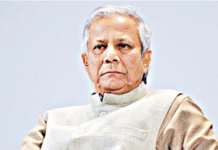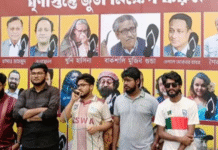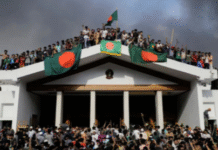The Coalition for Human Rights & Democracy in Bangladesh (CHRD Bangladesh) joins the United Nations, the Reporters Without Borders (RSF), the Committee to Protect Journalists (CPJ) and many other rights organizations, in and outside of Bangladesh, in condemning the recent spate of persecutions on journalists under the detested draconian Digital Security Act (DSA).
In the latest case, Shamsuzzaman Shams, of the leading daily Prothom Alo newspaper, was arrested by police without a warrant on March 29, 2023 under the authoritarian DSA for alleged “false, fabricated and ill-motivated” reporting on the country’s economic situation. The police seized his laptop, phones and other information materials. Shams was denied bail and sent to jail the next day. He may face a 14-year jail term. Immediately afterwards, Matiur Rahman, the publisher of the daily was also charged for publishing the reports on the publication’s Facebook page.
The United Nations High Commissioner for Human Rights Volker Turk demanded Bangladesh to urgently suspend the DSA because its application grossly violates the human rights of the journalists and critics of the regime of Prime Minister Sheikh Hasina. The High Commissioner had earlier urged for reform of the Act to bring it in line with international standards. Instead of heeding the request, Dhaka intensified its application against the critics of the regime in the run up to the next election due in a few months. Turk was concerned that the DSA “is being used across Bangladesh to arrest, harass and intimidate journalists and human rights defenders, to muzzle critical voices online.” (Please see CHRD Bangladesh (Please see: Statement Against The Digital Security Act Of Bangladesh | ChrdBangladesh).
Paris based Reporters Without Borders (RSF) urged the immediate release of Shams and demanded that “Prime Minister Sheikh Hasina must end her government’s increasingly authoritarian response to criticism in the media.” In 2022, RSF placed Bangladesh at 162, out of 180, in media freedom. Recently, Bangladesh blocked 191 websites for alleged “anti-state activities.”
Sheikh Hasina has been running a fascist administration since her installation in 2009 through a farcical electoral process orchestrated by her sponsor India. She continued to stay there by defrauding subsequent elections.
“The arrest and harassment of Bangladeshi journalist Shamzuzzaman Shams under the draconian Digital Security Act is an excessive reaction by authorities that smacks of intimidation,” says Carlos Martinez de la Serna, of the CPJ’s New York office.
The 12-Nation Media Freedom Coalition (MFC) in Dhaka also expressed their concern at the continuing violence and intimidation of journalists in Bangladesh. Signatories to the statement were Australia, Canada, Denmark, France, Germany, Italy, Netherlands, Norway, Sweden, Switzerland, the United Kingdom and the United States of America.
The Coalition for Human Rights & Democracy in Bangladesh strongly urges the United States, the United Nations and the global democratic community to act without delay in removing the illegal fascist regime of Sheikh Hasina and bailing the Bangladeshi people out of their prolonged suffering of more than a decade. To ensure that democracy, human rights and good governance exist in the country, the only legal way out is to hold a free, fair and participatory election under a nonpartisan, neutral caretaker administration. The Hasina administration is incapable of holding any fair elections.










